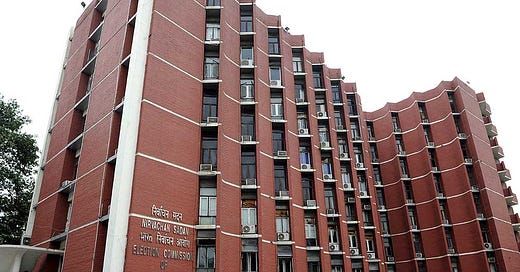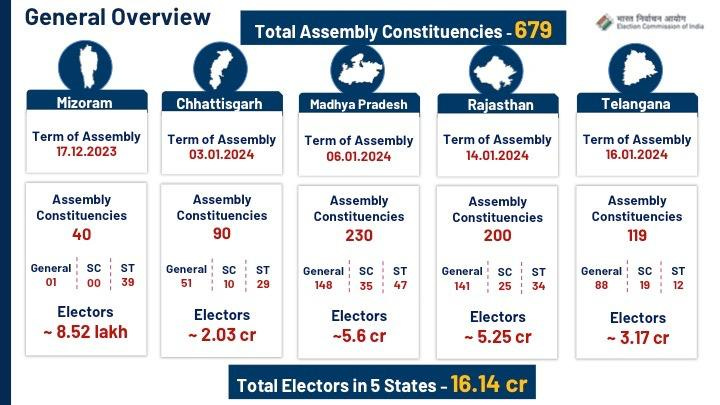Vidhan Sabha Elections in 5 States— all that you need to know.
Mizoram - Nov 7; Chhattisgarh - Nov 7 & Nov 17; Madhya Pradesh - Nov 17; Rajasthan - Nov 23; Telangana - Nov 30. Counting 3rd December, 2023.
ECI announces the Poll Schedule— counting on 3rd December, 2023
The Election Commission of India announced, just a few minutes ago, the schedule for the Vidhan Sabha elections in the five states of Rajasthan, Madhya Pradesh, Chhattisgarh, Telangana, and Mizoram. With the announcement of the dates, the “Model Code of Conduct” has come into force with immediate effect, severely restricting the decision-making powers of the incumbent governments in these states.
The polling dates for each of these five states are summarised below. Counting in all these states will take place on a single date, specifically on 3rd December 2023, and all the results are likely to be available by the evening.
Mizoram - Nov 7
Chhattisgarh - Nov 7 & Nov 17
Madhya Pradesh - Nov 17
Rajasthan - Nov 23
Telangana - Nov 30
Heightened Interest— last state elections before the 2024 General Elections
Given that these are the final Vidhan Sabha elections in five significant states before the pivotal 2024 Lok Sabha general elections, the attention of many will be keenly focused on the outcomes. This attention is heightened, particularly as Rajasthan, Madhya Pradesh, and Chhattisgarh form part of what is commonly known as the Hindi belt, outside of Uttar Pradesh and Bihar.
We also take this opportunity to reproduce the figures from the previous Vidhan Sabha elections held in 2018 for these states and the subsequent results of the Lok Sabha elections just six months later in 2019.
Existing Picture in the Vidhan Sabhas
Madhya Pradesh:
Vidhan Sabha Seats: 230
Last Election: 2018
Party in Power: Bharatiya Janata Party (BJP)
Chief Minister: Shivraj Singh Chouhan
Chhattisgarh:
Vidhan Sabha Seats: 90
Last Election: 2018
Party in Power: Indian National Congress (INC)
Chief Minister: Bhupesh Baghel
Rajasthan:
Vidhan Sabha Seats: 200
Last Election: 2018
Party in Power: Indian National Congress (INC)
Chief Minister: Ashok Gehlot
Telangana:
Vidhan Sabha Seats: 119
Last Election: 2018
Party in Power: Telangana Rashtra Samithi (TRS)
Chief Minister: K. Chandrashekar Rao
Mizoram:
Vidhan Sabha Seats: 40
Last Election: 2018
Party in Power: Mizo National Front (MNF)
Chief Minister: Zoramthanga
It may be noted that in the election results of Madhya Pradesh, while the Congress Party bagged 114 seats, as against 109 by the BJP, the government was formed by the BJP.
Existing Picture in the Lok Sabha in these 5 states
Madhya Pradesh:
Lok Sabha Seats: 29
2019 Election Result:
Bharatiya Janata Party (BJP): 28 seats
Indian National Congress (INC): 1 seat
Chhattisgarh:
Lok Sabha Seats: 11
2019 Election Result:
Indian National Congress (INC): 7 seats
Bharatiya Janata Party (BJP): 4 seats
Rajasthan:
Lok Sabha Seats: 25
2019 Election Result:
Bharatiya Janata Party (BJP): 24 seats
Rashtriya Loktantrik Party (RLP, an ally of BJP): 1 seat
Telangana:
Lok Sabha Seats: 17
2019 Election Result:
Telangana Rashtra Samithi (TRS): 9 seats
Bharatiya Janata Party (BJP): 4 seats
Indian National Congress (INC): 3 seats
All India Majlis-e-Ittehad-ul-Muslimeen (AIMIM): 1 seat
Mizoram:
Lok Sabha Seats: 1
2019 Election Result:
Mizo National Front (MNF): 1 seat
Barely 6 months apart, any relationship between the Vidhan Sabha and Lok Sabha Results?
Surprisingly, the outcomes of the Lok Sabha elections of 2019 bore little correlation to the Vidhan Sabha election results of December 2018. To put it bluntly, they seemed to be totally out of sync. Thus, while the results of these state elections are crucial in their local context, it would be a stretch of the imagination to use them to predict the likely outcome of the Lok Sabha elections in these five states, let alone for the entire nation.
Three Cheers for the ECI and the Election Machinery
While the Election Commission and its entire staff, from the District Election Officer/District Collector down to the polling officer in each booth, merit commendation for the effort and dedication they will invest in ensuring free and fair elections, political observers across the country should be cautious about drawing any major inferences for the 2024 Lok Sabha elections based solely on these results. The monarch of the process is, of course, the voter— technically called the elector— who forms the lynchpin of the Indian democracy.
Our $0.02
Cast your vote; don’t vote your caste.
Jai Hind!









